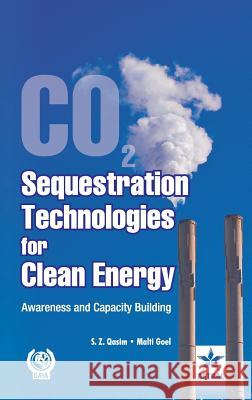Co2 Sequestration Technologies for Clean Energy: Awareness and Capacity Building » książka
Co2 Sequestration Technologies for Clean Energy: Awareness and Capacity Building
ISBN-13: 9788170359852 / Angielski / Twarda / 2010 / 224 str.
The book 'CO2 Sequestration Technologies for Clean Energy' is about management of CO2 by capturing and fixing it away from the atmosphere for clean energy development. Energy industry is the target industry for adoption of CCS in fossil fuel based economies. In a coal based power plant CO2 can be captured at various stages of pre-combustion, during combustion and post combustion. Research work being carried out on mixed metal oxides as CO2 absorbents for pre-combustion capture and pressure swing adsorption techniques for CO2 post combustion capture are discussed in two different chapters. These and new coal combustion technology such as oxy coal combustion, issues in long-term climate change challenge, corporate response as well as perspectives in CO2 sequestration pathways including policy assessments are covered in separate Chapters from 1 to 6. Biological methods of post combustion CO2 sequestration are dealing with microalgae and microbial research. Ongoing research on photo bioreactors and solar bio-reactors; safe and novel concepts using different micro-remediation techniques for permanent capture of CO2 are explained in Chapters 7, 9, 10. Can underground CO2 sequestration result in value added products from depleted or abandoned oil or coal fields? We cover CO2 sequestration perspectives and assessment in Oil sector and prospects of enhanced coal bed methane recovery in Coal sector with recent efforts made in Chapters 8, 11, 12. Approach to storage of CO2 in ocean waters and fertilization of phytoplankton is described in Chapter 13. Chapter 14 deals with soil and vegetation sequestration of CO2 in forest ecosystem. Chapter 15 exclusively presents views of the experts on CO2 mitigation strategies in Power sector. Open roundtable discussion on clean development mechanism, views expressed on financing approaches as well as technical issues in the context of greenhouse gas emissions and clean energy fuels are presented in Chapter 16. Research results in physical, biological and chemical methods of CO2 sequestration are described in a lucid manner with explanations and examples to create awareness among different sectors of economy. This book is useful for the scientists, technologists and policy makers working on clean energy and environment.
The book CO2 Sequestration Technologies for Clean Energy is about management of CO2 by capturing and fixing it away from the atmosphere for clean energy development. Energy industry is the target industry for adoption of CCS in fossil fuel based economies. In a coal based power plant CO2 can be captured at various stages of pre-combustion, during combustion and post combustion. Research work being carried out on mixed metal oxides as CO2 absorbents for pre-combustion capture and pressure swing adsorption techniques for CO2 post combustion capture are discussed in two different chapters. These and new coal combustion technology such as oxy coal combustion, issues in long-term climate change challenge, corporate response as well as perspectives in CO2 sequestration pathways including policy assessments are covered in separate Chapters from 1 to 6. Biological methods of post combustion CO2 sequestration are dealing with microalgae and microbial research. Ongoing research on photo bioreactors and solar bio-reactors; safe and novel concepts using different micro-remediation techniques for permanent capture of CO2 are explained in Chapters 7, 9, 10. Can underground CO2 sequestration result in value added products from depleted or abandoned oil or coal fields? We cover CO2 sequestration perspectives and assessment in Oil sector and prospects of enhanced coal bed methane recovery in Coal sector with recent efforts made in Chapters 8, 11, 12. Approach to storage of CO2 in ocean waters and fertilization of phytoplankton is described in Chapter 13. Chapter 14 deals with soil and vegetation sequestration of CO2 in forest ecosystem. Chapter 15 exclusively presents views of the experts on CO2 mitigation strategies in Power sector. Open roundtable discussion on clean development mechanism, views expressed on financing approaches as well as technical issues in the context of greenhouse gas emissions and clean energy fuels are presented in Chapter 16. Research results in physical, biological and chemical methods of CO2 sequestration are described in a lucid manner with explanations and examples to create awareness among different sectors of economy. This book is useful for the scientists, technologists and policy makers working on clean energy and environment.











